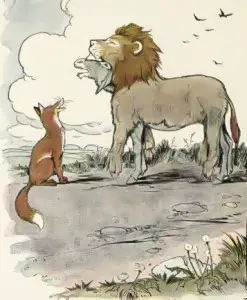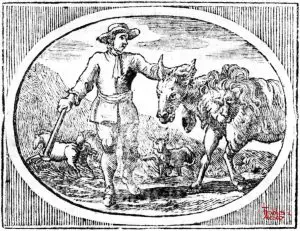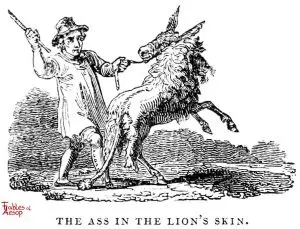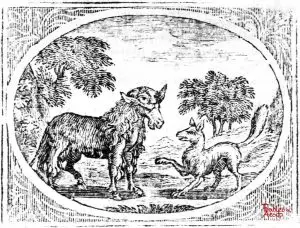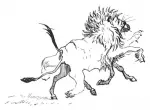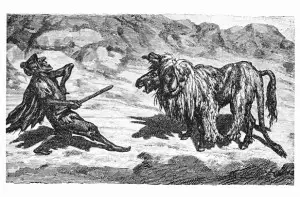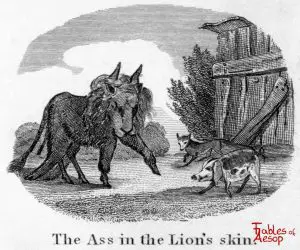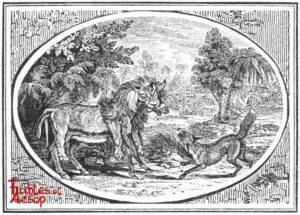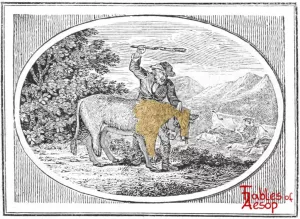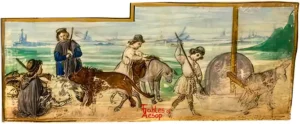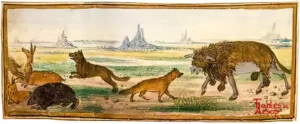Fine clothes may disguise, but silly words will disclose a fool. An ass decides to have fun and dresses as a lion. The ass is found out and beaten. Shame.
Fine clothes may disguise, but silly words will disclose a fool.

Aesop For Children
An Ass found a Lion’s skin left in the forest by a hunter. He dressed himself in it, and amused himself by hiding in a thicket and rushing out suddenly at the animals who passed that way. All took to their heels the moment they saw him.
The Ass was so pleased to see the animals running away from him, just as if he were King Lion himself, that he could not keep from expressing his delight by a loud, harsh bray. A Fox, who ran with the rest, stopped short as soon as he heard the voice. Approaching the Ass, he said with a laugh:
“If you had kept your mouth shut you might have frightened me, too. But you gave yourself away with that silly bray.”
Moral
A fool may deceive by his dress and appearance, but his words will soon show what he really is.

Eliot/Jacobs Version
An Ass once found a Lion’s skin which the hunters had left out in the sun to dry. He put it on and went towards his native village. All fled at his approach, both men and animals, and he was a proud Ass that day. In his delight he lifted up his voice and brayed, but then every one knew him, and his owner came up and gave him a sound cudgelling for the fright he had caused. And shortly afterwards a Fox came up to him and said: “Ah, I knew you by your voice.”
[Note: Croxall has two versions of the same fable.]

Samuel Croxall
AN Ass, finding the skin of a Lion, put it on; and going into the woods and pastures, threw all the flocks and herds into a terrible consternation. At last, meeting his owner, he would have frightened him also; but the good man, seeing his long ears stood out, presently knew him, and with a good cudgel made him sensible, that, notwithstanding his being drest in a Lion’s skin, he was really no more than an Ass.
THE APPLICATION
As all affectation is wrong, and tends to expose and make a man ridiculous, so the more distant he is from the thing which he affects to appear, the stronger will the ridicule be which he excites, and the greater the inconveniences into which he runs himself thereby. How strangely absurd it is for a timorous person to procure a military post, in order to keep himself out of danger! and to fancy a red coat the surest protection of cowardice! yet there have been those who have purchased a commission to avoid being insulted; and have been so silly as to think courage was interwoven with a sash, or tied up in a cockade. But it would not be amiss for such gentlemen to consider, that it is not in the power of scarlet, cloth to alter nature; and that, as it is expected a soldier should show himself a man of courage and intrepidity upon all proper occasions, they may by this means meet the disgrace they intended to avoid, and appear greater asses than they need to have done. However, it is not in point of fortitude only, that people are liable to expose themselves, by assuming a character to which they are not equal; but he who puts on a show of learning, of religion, of a superior capacity in any respect or, in short, of any virtue or knowledge to which he has no proper claim, is, and will always be found to be, an Ass in a Lion’s Skin.

Samuel Croxall (The Fox and the Ass)
AN Ass finding a Lion’s shin [skin], disguised himself with it, and ranged about the forest, putting all the beasts that saw him into a bodily fear. After he had diverted himself thus for some time, he met a Fox: and being desirous to fright him too, as well as the rest, he leapt at him with some fierceness, and endeavoured to imitate the roaring of the Lion. Your humble servant, says the Fox, if you had held your tongue, I might have taken you for a Lion, as others. did: but now you bray, I know who you are.
THE APPLICATION
This is so trite and common a subject, that there is scarce any one who is ignorant of it. A man is known by his words, as a tree is by the fruit; and if we would be apprized of the nature and qualities of any one, let him but discourse, and he himself will speak them to us, better than another can describe them. We may therefore perceive from this fable, how proper it is for those to hold their tongues, who would not discover the shallowness of their understandings.
Asses and Owls, unseen, themselves betray,
When these attempt to hoot, or those to bray. GARTH.
The deepest rivers are most silent; the greatest noise is ever found where, there is the least depth of water. And it is a true observation, that those who are the weakest in understanding and most slow of apprehension, are generally the strongest in opinion, and most precipitate in uttering their crude conceptions. When, with a secret awe, we regard the grave dress and important mien of some senatorial! person, whom we have chanced to meet in a coffee-house, what a speaker do we often think he must be before we. hear him speak! His air breathes the seriousness of a privy counsellor, and his erect aspect the dignity of an eminent patriot: but he utters himself, and undeceives us; he brays, and tells the whole company what he is.

Caldecott
An Ass who had dressed himself up in a Lion’s skin was mistaken by everybody for a lion, and there was a stampede of both herds and men. But presently the skin was whisked off by a gust of wind, and the Ass stood exposed; and then the men all charged at him, and with sticks and cudgels gave him a sound drubbing.

JBR Collection
An Ass finding the skin of a Lion, put it on, and in that disguise spread terror through all the neighbourhood round. His master, however, spying his long ears, and recognising his voice, took a stout cudgel, and soon made him sensible that he was no more than an Ass.

Jefferys Taylor
AN ass who imagined his virtues neglected,
And saw that his talents were little respected;
Supposing folks judged of his worth by his skin,
Resolved the first good one he saw to creep in.
Soon after he found the fine coat of a lion;
“Oh! this,” thought the ass, “by all means I will try on,”
Which at last he contriv’d to throw over his shoulders;
“Now,” said he, “with what awe shall I strike all beholders!”
Then he went to a pond to survey himself in it,
And when he had stay’d to adjust it a minute,
Had had the last look, and felt sure it would do,
To his neighbours he hasted to make his debut.
“Dear! now,” said the beast, “how provoking it is,
Not a soul’s to be seen such a fine day as this!”
—I wish though it would not hang over one’s eyes;
I must try to procure one that’s nearer my size.”
Just after he met a stray pig in the road,
So he look’d as terrific and fierce as he could;
But instead of his showing the smallest dismay,
The pig only grunted, and kept on his way.
He next saw a fox, and, to fright him the more,
He tried, when they met, like a lion to roar:
“Ah!” said Reynard, “think not for a lion to pass,
While you act like a donkey, and bray like an ass.”
Vulgar people well drest will be sure to be known;
For the moment they speak, their vulgarity’s shown.

Townsend version
An ass, having put on the Lion’s skin, roamed about in the forest and amused himself by frightening all the foolish animals he met in his wanderings. At last coming upon a Fox, he tried to frighten him also, but the Fox no sooner heard the sound of his voice than he exclaimed, “I might possibly have been frightened myself, if I had not heard your bray.”
[Note: Bewick also has two versions of basically the same fable.]

Thomas Bewick (The Fox and The Ass)
An Ass finding a Lion’s skin, disguised himself in it, and ranged about the forest, putting all the beasts in bodily fear. After he had diverted himself thus for some time, he met a Fox, and being desirous to frighten him too, as well as the rest, he leapt at him with some fierceness, and endeavoured to imitate the roaring of a Lion. Your humble servant, says the Fox, if you had held your tongue, I might have taken you for a Lion, as others did, but now you bray, I know who you are.
APPLICATION.
A man is known by his words, as a tree is by the fruit; and if we would be apprized of the nature and qualities of any one, let him but discourse, and he will speak them to us better than another can describe them. We may therefore perceive, from this Fable, how proper it is for those to hold their tongues, who would not discover the shallowness of their understandings. “Empty vessels make the greatest sound,” and the deepest rivers are most silent; the greatest noise is ever found where there is the least depth of water. It is a true observation, that those who are the weakest in understanding, and most slow of apprehension, are generally the most precipitate in uttering their crude conceptions. Grave looks, an aspect of dignity, and a solemn deportment, may sometimes deceive even an accurate observer; but wise discourse cannot be successfully counterfeited or assumed, and the sententious blockhead is as easily recognised as the pert coxcomb. It matters not what disguise one of these may assume; he utters himself, and undeceives us: he brays, and tells the whole company what he is.
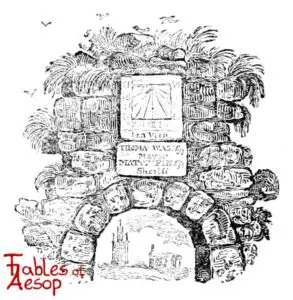

Thomas Bewick (The Ass in The Lion’s Skin)
An Ass, while feeding upon the coarse herbage by the edge of a wood, found a Lion’s skin, and putting it on, went in this disguise into the adjoining forests and pastures, and threw all the flocks and herds into the greatest consternation and dismay. At length, his master, who was in search of him, made his appearance, and the silly beast, entertaining the idea of frightening him also, capered forward with a terrific gait towards him; but the good man seeing his long ears stick out, presently knew him, and with a stout cudgel made him sensible, that notwithstanding his being dressed in a Lion’s skin, he was really no more than an Ass.
APPLICATION.
As all affectation is wrong, and tends to expose and make a man ridiculous, so the more distant he is from the thing which he affects to appear, the stronger will be the ridicule which he excites, and the greater the inconvenience into which he thereby runs himself. How strangely absurd it is for a timorous person to procure a military post, in order to keep himself out of danger! and to fancy a red coat the surest protection for cowardice! Yet there have been those who have purchased a commission to avoid being insulted; and have been so silly as to think courage was interwoven with a sash, or tied up in a cockade. But it would not be amiss for such gentlemen to consider that it is not in the power of scarlet cloth to alter nature, and that as it is expected a soldier should shew himself a man of courage and intrepidity upon all proper occasions, they may by this means meet the disgrace they intended to avoid, and appear greater Asses than they needed to have done. However, it is not in point of fortitude only that people are liable to expose themselves, by assuming a character to which they are not equal; but he who puts on a shew of learning, of religion, of a superior capacity in any respect, or in short, of any virtue or knowledge, to which he has no proper claim, is, and will always be found to be, an Ass in a Lion’s skin.

JBR Collection (The Fox and The Ass)
An Ass finding a Lion’s skin, put it on, and ranged about the forest. The beasts fled in terror, and he was delighted at the success of his disguise. Meeting a Fox, he rushed upon him, and this time he tried to imitate as well the roaring of the Lion. “Ah,” said the Fox, “if you had held your tongue, I should have been deceived like the rest; but now you bray, I know who you are.”

Crane Poetry Visual
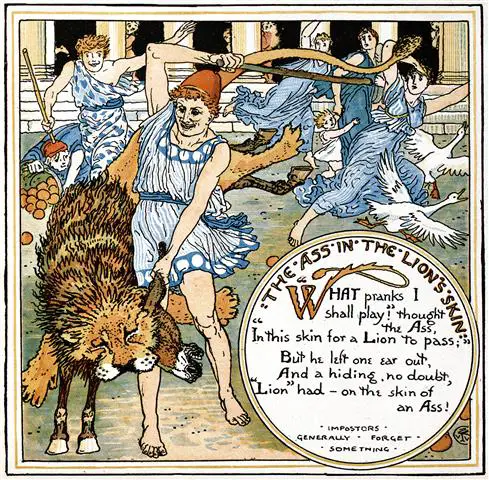
“What pranks I shall play!” thought the Ass,
In this skin for a Lion to pass;
But he left one ear out,
And a hiding, no doubt,
“Lion” had-on the skin of an Ass!
Imposters generally forget something.

Gherardo Image from 1480
As above for the authors, there appear to be two Gherardo images for this same fable.

Asinus Leonis Pelle Indutus
Asinus, in silvam veniens, exuvias leonis offendit. Quibus indutus, in pascua redit, greges et armenta territans fugansque. Herus autem, qui vagum fallacemque asinum perdiderat, occurrit. Asinus, viso hero, cum rugitu obviam fecit. At herus, prehensis quae extabant auriculis, “Alios licet,” inquit, “fallas; ego te probe novi.”
Moral
Quod non es, nec te esse simules.
Perry #188
